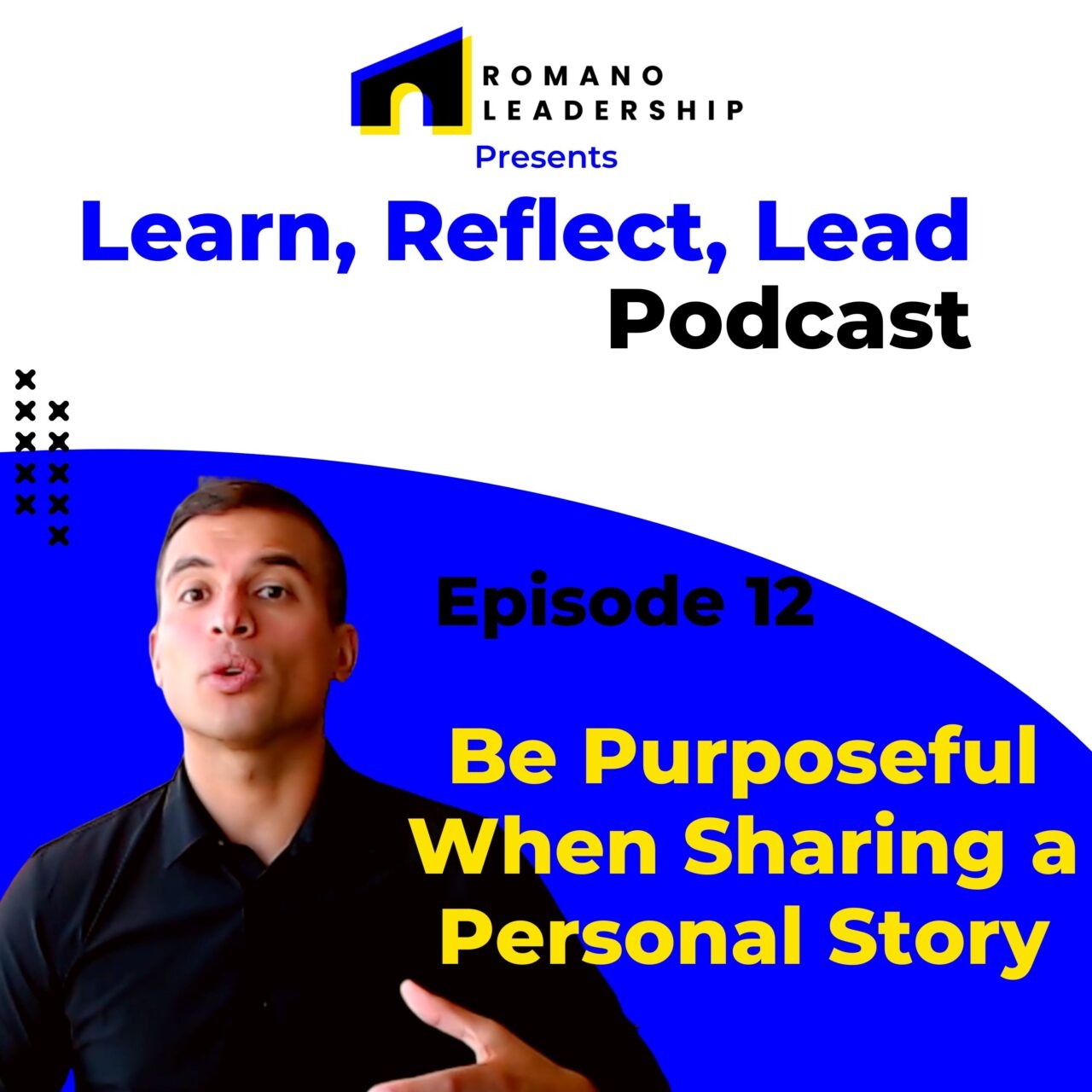Speaker 0 00:00:00 From Romano Leadership, I'm Oscar Romano. This is Learn, reflect Lead Leadership and D E I A development for mission-driven individuals and organizations. This episode is titled Addressing Mental Health as an Educator of Color. This episode is for you if you are an educator of color who wants strategies on how to address mental health concerns if you are a white educator and want to understand mental health burdens experienced by educators of color, or if you're a leader who wants strategies to support educators of color. Today we're gonna focus on how to address mental health as an educator of color. Did you know that more than 50% of public school students are students of color, but only 20% of public school teachers are people of color? Such a disproportionate relationship places a greater necessity on retaining educators of color in the workforce. As an educator of color, you need to ensure you are taking care of your needs because it can be easy to set them aside as you work to fulfill the needs of others.
Speaker 0 00:01:05 In particular, I encourage all educators of color to evaluate and address their mental health needs because educators of color can experience unique burdens compared to their white counterparts, and when unaddressed. The impacts of these burdens can cause more significant issues like anxiety and depression, potentially leading to an eventual departure from the profession. Addressing mental health as an educator of color can be challenging, but highly gratifying when leveraging the right strategies. So here's some burdens that educators of color experience in their day-to-day lives. Number one, extreme empathy. The connection to their community that makes 'em an asset can also be a liability. Educators of color can be too connected with their students and the community they serve. They might empathize so much with their students that the responsibility they feel toward their students is overwhelming and all encompassing. For example, when I was a first year teacher, I felt so duty bound to help my immigrant students who were struggling in all their classes that often struggled sleeping.
Speaker 0 00:02:00 I couldn't separate my work and home lives. Number two, hiding your identity. If you're one of the only educators of color in your organization, you can feel pressure to conform to the norms of the organization. When these norms don't align with who you are or don't consider your perspective, it can feel suffocating. On the one hand, you want to be in a place where you can be yourself, but on the other hand, you feel like you have to stay for the sake of your students. For example, now this is an extreme one. One of my friends told me about how a white staff member reprimanded her for speaking Spanish to another Spanish speaking colleague because the white staff member didn't feel comfortable, the white staff member was pushing her to silence a part of her identity. Number three, additional workloads. Educators of color regularly have to perform additional duties due to their background.
Speaker 0 00:02:47 When these additional duties aren't adequately recognized or compensated, it can feel like educators of color are paying a toll to fill the same role as white educators who do not have to complete these additional responsibilities. For example, from the moment I started working in the classroom, I always had additional duties related to Spanish translation, which sometimes extended to supporting other non-Spanish speaking staff members. All that extra work always went unpaid. Number four, unclear career advancement opportunities. It's normal for people to compare their experiences with those in positions above their own to see what might be possible. When there are few to know people of color in those positions, it sends a message to educators of color that there isn't a place for them. For example, a client once told me about their hesitation in applying for leadership positions because they would be the first person of color in that role.
Speaker 0 00:03:41 That fact made them think that upward mobility wasn't possible. Number five, insufficient mentorship. When you have questions about how to do things, you might ask somebody who has experienced that situation for advice. If your question is particularly to a person of color's, experience and they're no people of color to go to, then you're stuck having to figure it out on your own. For example, in an organization with a limited number of educators of color, a quality mentor is a scarce, a scarce resource that few people would've access to. Many wouldn't know who they can go to, and here's some strategies to address your mental health. Before attempting any of the following strategies, you need to know that any struggles you face aren't a sign of weakness, but an opportunity for growth. Otherwise, your heart won't be in it and you'll be less likely to achieve the results you're looking for.
Speaker 0 00:04:32 Number one, find your locus of control. Your locus of control is the area around you that you can control. The further away something is from the center, the less impact you can have. Think about what aspects of any given situation are in your control. Ask yourself what actions you can really be expected to take. Commit to those actions and know you did your best. It can seem immeasurable and impossible to address an issue when you don't spend time identifying your locus of control for that issue. Number two, attend therapy. There is so much research on the benefits of therapy, but just as much stigma around it. For people in communities of color, there can be an exceptionally high level of resistance toward therapy and other mental health practices. Men of color in particular can receive messages from a young age that therapy and services like it are a sign of weakness.
Speaker 0 00:05:25 From personal experience, I can tell you that it takes much more strength to face my challenges head on and actively work to resolve. Number three, practice meditation. I used to say that meditation wasn't for me. I was diagnosed with ADHD in college and used that as an excuse to say that my mind wandered way too much to be able to practice meditation. I've learned that meditation can help you clear your mind, be more aware of what you're thinking and feeling, and find a sense of calm among the turbulence of your thoughts. It doesn't come easy though, and requires persistence and patience. Number four, work with the coach. Whereas a therapist can help you with thought your thoughts and feelings, a coach provides you with more targeted support and development around your experiences. At work, a coach can provide you with the sounding board that you can leverage to determine how to deal with specific situations.
Speaker 0 00:06:18 Warning, your coach is not a therapist. That's a completely different profession and you should think about it as such. Number five, establish allies in this came. In this case, teamwork really makes the dream work and four heads are better than one. While many people find allies to vent to, I push you to find allies with whom you can make action plans so everybody gets ahead. They can give you some time and area of frustrations, but shouldn't encourage you to stay in that mode indefinitely. They push you to action eventually. Number six, find a mentor. It's extremely powerful to learn from somebody who has been in your shoes and can provide you with a higher level perspective that you can connect with. They can help you avoid obstacles they experience, show you how to navigate the system and provide you with tested strategies to get ahead.
Speaker 0 00:07:07 If you can't find one in your organization, you can search externally. And number seven, join an affinity group while a group of allies in the form of your friends and colleagues can be powerful. Another approach is joining a formal affinity group of people with a shared background. Formal affinity groups can have established processes, systems, and connections that can prove valuable to you. A simple Google search or a particular type of affinity group that you're looking for can give you some leads. There are tons out there As as we close out, I urge you to make it a priority. Addressing your mental health needs to take priority in your life. Treat it like you with an open wound with great hair and attention. As an educator of color, I know how easy it is to set aside your own needs because of the number of things on your plate. I also know what happens when you allow your needs to go unaddressed. You won't be able to help anybody if you're too mentally drained to fully engage or continue in the profession. Now it's time to commit. What strategy will you try out to help improve your mental health and what strategy can you share with an educator of color to help them improve their mental health? Let me know how it goes. Thanks.
Speaker 1 00:08:22 That's it for this episode of Learn, reflect Lead. Thank you for watching on YouTube or listening via podcast. If you're interested in more, you can find
[email protected] or connect with me on LinkedIn at Romano Leadership. If you like this episode, please share it with your friends. Subscribe and leave a review. I'm Oscar Ramo. Until next time.


